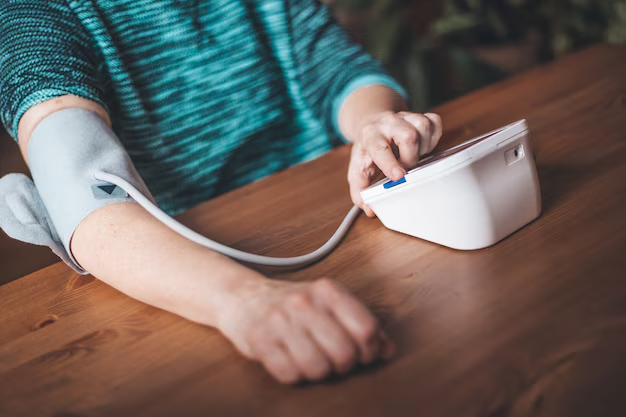Your Guide to What Is a Hypertensive Crisis
What You Get:
Free Guide
Free, helpful information about HyperTension FAQ and related What Is a Hypertensive Crisis topics.
Helpful Information
Get clear and easy-to-understand details about What Is a Hypertensive Crisis topics and resources.
Personalized Offers
Answer a few optional questions to receive offers or information related to HyperTension FAQ. The survey is optional and not required to access your free guide.
Understanding Hypertensive Crisis: What You Need to Know
Imagine sitting at home, sipping on your morning coffee, and suddenly feeling dizzy, experiencing blurred vision, or even severe chest pain. These symptoms could be your body's way of alerting you to a hypertensive crisis, a serious condition that demands immediate medical attention. This term might sound like complex medical jargon, but understanding it can be crucial for your health and well-being.
What Is a Hypertensive Crisis?
A hypertensive crisis occurs when blood pressure rises quickly and extremely high, often above 180/120 mmHg. This condition is categorized into two types:
Hypertensive Urgency: Your blood pressure is dangerously high, but there's no evidence of immediate organ damage. Symptoms might include severe headaches, shortness of breath, or nosebleeds.
Hypertensive Emergency: This is more severe, where high blood pressure leads to potential organ damage. It can affect the heart, kidneys, brain, and eyes, leading to symptoms like chest pain, severe headache, confusion, or even seizures.
Recognizing the Symptoms
Symptoms of a hypertensive crisis can often be mistaken for less severe conditions, making awareness critical:
- Severe headache and anxiety
- Shortness of breath
- Nausea or vomiting
- Blurred vision or vision changes
- Chest pain
If you experience any of these along with extremely high blood pressure, it's vital to seek emergency medical care immediately.
Preventing a Hypertensive Crisis
Preventative measures are key in reducing the risk:
- Monitor your blood pressure regularly to catch any concerning spikes early.
- Maintain a healthy diet low in salt, saturated fats, and cholesterol.
- Exercise regularly to keep your heart and vascular system in good working order.
Managing your lifestyle is not only beneficial for health but can save you from the financial strain that medical emergencies can bring.
The Financial Angle: Planning for Health Crises
A hypertensive crisis, like other health emergencies, can lead to unexpected medical expenses. However, being financially prepared can mitigate this burden. Here are some avenues worth exploring:
Health Insurance and Government Aid
Health insurance is your first line of defense against sudden medical costs. Examine your policy to ensure it covers emergencies. If you're uninsured, look into government aid programs that provide affordable health care solutions.
Financial Assistance and Debt Relief
In the event of high medical bills, financial assistance programs are available to help manage costs. These can range from hospital payment plans to nonprofit organizations offering debt relief and support for medical debt.
Educational Grants and Credit Solutions
If medical bills disrupt your financial stability, consider credit solutions to manage debt. Opening a low-interest credit card for emergencies or consolidating debt could make payments more manageable. Additionally, educational grants and scholarships can be a resource if pursuing further education is part of your financial improvement plan.
Research and planning for these options can aid in buffering against emergencies while promoting financial stability.
Financial and Educational Resources List 🌟
- Health Insurance Options: Medicaid, Affordable Care Act Plans
- Government Aid Programs: Medicare, CHIP (Children’s Health Insurance Program)
- Financial Assistance: Hospital financial aid programs, nonprofit debt relief
- Credit Solutions: Low-interest emergency credit cards, debt consolidation
- Educational Opportunities: FAFSA for educational grants, work-study programs for additional income
Being aware of and preparing for health crises like a hypertensive emergency with both lifestyle changes and financial strategies constitutes a holistic approach to overall well-being. Taking proactive steps not only safeguards your health but also fortifies your financial resilience, making the unexpected a little less daunting.
What You Get:
Free HyperTension FAQ Guide
Free, helpful information about What Is a Hypertensive Crisis and related resources.

Helpful Information
Get clear, easy-to-understand details about What Is a Hypertensive Crisis topics.

Optional Personalized Offers
Answer a few optional questions to see offers or information related to HyperTension FAQ. Participation is not required to get your free guide.


Discover More
- a 66 Year Old Female With a History Of Hypertension
- Are Eggs Bad For Hypertension
- Are Eggs Good For Hypertension
- Are Endocrine Disorders Causing Hypertension Rare
- Can Adderall Cause Hypertension
- Can Alcohol Cause Hypertension
- Can Allergies Cause Hypertension
- Can Anemci People Get Hypertension
- Can Anemia Cause Hypertension
- Can Antibiotics Cause Hypertension
